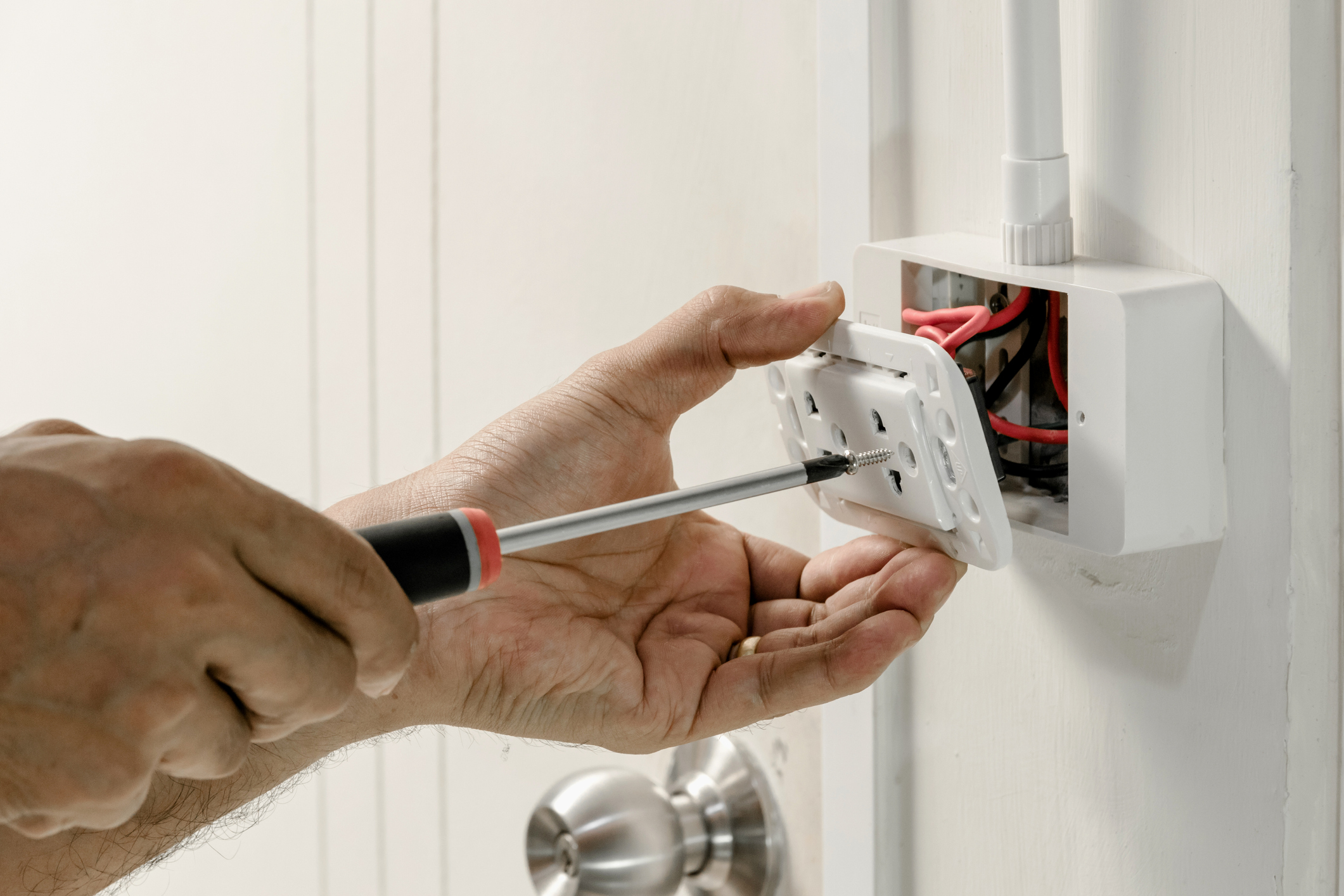What Does a Buzzing Electrical Outlet Mean?

You plug in your laptop and hear an unsettling buzz coming from the outlet. Don’t ignore that buzzing sound – it could indicate an electrical issue that needs prompt attention.
A buzzing electrical outlet is often a warning sign that something is amiss with your home’s wiring or electrical system. The buzzing noise can stem from various problems like loose connections, outdated wiring, overloaded circuits, electrical interference, or even pests in the outlet box.
While a temporary buzz may not seem serious, it’s important to identify and address the underlying cause quickly. Left unchecked, that buzzing outlet could lead to electrical hazards like arcing, overheating, shocks or fires down the line.
In this guide, we’ll walk through the most common reasons for a buzzing outlet and provide straightforward steps to diagnose and resolve the issue safely. Don’t let that buzz turn into a bigger shock – let’s get to the bottom of it right away.
Causes of a Buzzing Electrical Outlet
Okay, time to get to the bottom of why your outlet has decided to join the band with that incessant buzzing. While an electrical socket sounding like a kazoo player is never a great sign, the root cause could range from a minor loose connection to a serious wiring issue. Let’s run through the main offenders that might be behind that buzz.
Loose Electrical Connections
This is one of the most common culprits, and it makes sense. Those outlet connections need to be snug as a bug to deliver electricity properly. If the outlet receptacle itself is loose in the junction box, or if the wiring connections have worked themselves loose over time, you’ve got a recipe for buzzing.
Here’s what happens: When those connections aren’t tight, there’s increased electrical resistance as the current flows through. That resistance causes heat buildup and arcing, which in turn creates vibrations – aka the buzzing sound you’re hearing. Left unchecked, that loose connection can eventually lead to melting, sparking and even an electrical fire. Yikes.
Faulty or Outdated Wiring
Older homes in particular may be plagued by outdated wiring that’s damaged, degraded or no longer up to snuff for modern electrical needs. Wiring insulation can break down over decades, wires can get nicked or corroded, and outdated aluminum wiring is notorious for connection issues.
The end result? Electricity doesn’t flow as cleanly and efficiently through those compromised wires. That resistance and arcing can cause the buzzing noise at outlets and switches on the faulty circuit. It’s also a safety hazard, as that damaged wiring has a higher risk of shorting out and starting an electrical fire.
Overloaded Circuits
We’re using more electrical devices and appliances than ever in our homes these days. Overloading a circuit by plugging in too many high-draw items can quickly overtax your home’s electrical capacity. When you hear buzzing at an outlet on an overloaded circuit, it’s a sign that too much current is trying to flow through that wiring.
The excessive electrical load causes increased resistance and heat buildup in the wiring. That heat makes the wires vibrate slightly, which you hear as buzzing from the outlet. It’s also putting dangerous stress on the circuit that could lead to arcing, melting wires, tripped breakers or even an electrical fire.
Electrical Interference
Sometimes that buzzing outlet is caused by interference from other electrical devices in your home. The offender is usually a large motor-driven appliance like a refrigerator, AC unit, vacuum or power tool. These create strong electromagnetic fields as they operate.
Those fluctuating magnetic fields can induce a current on nearby wiring and outlets, which translates to buzzing or humming noises. It’s a nuisance for sure, but likely not an immediate safety hazard unless the interference is extreme. Still, it’s smart to try and identify the culprit device and minimize the effect.
Pests or Debris in the Outlet Box
You might be sharing that outlet box with some unwanted tenants – pests or debris. If critters like mice or insects have made their home in the outlet box, or if it’s packed with dust and gunk, you’ll probably hear buzzing.
With pests, the sound is caused by their movements disrupting the electrical flow as they brush up against wires and connections. Debris can have a similar effect, plus it provides nesting material for pests. Either way, it’s a fire hazard having all those obstructions in such a sensitive area.
As you can see, most of the common causes of a buzzing outlet aren’t just background noise – they’re legit safety concerns that need addressing promptly. While the buzz itself is more of a nuisance, it’s often the first warning sign of an underlying electrical issue that could turn hazardous if ignored.
But don’t panic just yet! We still need to properly diagnose what’s actually going on before taking any action. Sometimes the buzzing has a simple fix, while other cases may require an electrician’s expertise. Either way, getting to the root cause is key to resolving that buzz once and for all.
Identifying the Cause of the Buzzing
Now that we’ve covered all the potential culprits, it’s time to do some electrical sleuthing. Properly diagnosing what’s behind that buzzing outlet is crucial before you can fix the issue. Otherwise, you’re just taking stabs in the dark – not a great approach when dealing with potential electrical hazards.
Fortunately, there are a few basic troubleshooting steps you can try yourself to help identify the cause. We’ll start with the easiest, least invasive techniques first before moving on to anything more involved. Safety first, right?
Visual Inspection
Grab a flashlight and take a close look at the buzzing outlet itself. Carefully remove the cover plate and see if you notice any obvious issues like:
- Loose wiring connections that need tightening
- Signs of damage like burn marks, melted plastic or corrosion
- Debris, dust buildup or any critters taking up residence
- The outlet itself is loose or pulling away from the junction box
Sometimes the culprit is staring you right in the face! If the visual inspection doesn’t reveal anything obvious, it’s time to dig a little deeper.
Circuit Testing
For this next step, you’ll need to grab a basic tool – either a circuit tester or multimeter. These inexpensive gadgets can detect live voltage and help identify issues like:
- Overloaded circuits drawing too much current
- Faulty wiring or grounding problems on the circuit
- Interference from large appliances on the same circuit
To use a circuit tester, simply insert the probes into the outlet’s hot and neutral slots while it’s still energized. The tester will light up if it detects voltage, allowing you to check for inconsistencies.
A multimeter takes it a step further by measuring the exact voltage. You can use it to test for voltage drops, which can indicate loose connections or wiring faults.
If your testing reveals no issues with the outlet’s circuit, then the buzzing may be caused by electrical interference from another circuit or appliance. Tracking that down can get tricky without professional equipment.
Calling in a Pro
For the average homeowner’s abilities, those visual inspections and basic circuit tests are about as far as safe, effective troubleshooting can go. If you still can’t pinpoint the buzzing’s cause after those steps, it’s probably time to call in an expert electrician.
A pro will have more advanced testing tools and training to really diagnose complex electrical issues. They can inspect your home’s entire electrical service with thermal imaging, map out circuits, and safely take panels apart if needed. Basically, they have a whole other level of sleuthing capabilities.
While it may cost more upfront, an electrician can quickly identify what’s causing that buzz and give you an honest assessment of what’s needed to resolve it. That beats taking risks with hazardous electrical work as a DIY amateur. When it comes to electrical issues, calling a pro is the smart play!
So don’t just ignore that incessant buzzing from an outlet. Use these basic techniques to try diagnosing the cause yourself first. But if the troubleshooting hits a wall, it’s well worth looping in a licensed electrician to track down the gremlins. Fixing underlying electrical problems is no joke – let’s get that buzz quieted down the right way!
Addressing the Buzzing Issue
Alright, time to take action and silence that buzzing outlet once and for all! Now that you’ve identified the likely culprit, we can go over some straightforward steps to address it. Just keep in mind that dealing with any electrical issues always requires caution.
For minor problems you can DIY, we’ll walk through the safe procedures. Anything major will require calling in a pro electrician. No need to play amateur electrician and risk getting zinged – your safety is the top priority here.
Tightening Loose Connections
If your troubleshooting revealed loose wiring connections causing that buzzing outlet, you’re in luck. This is one of the easier fixes to handle yourself, as long as you take the right precautions:
- Shut off the circuit breaker controlling that outlet to cut power while you work. Don’t just go winging it with live electricity!
- Use a non-contact voltage tester on the outlet to verify the power is off before proceeding.
- Remove the outlet cover plate and use a screwdriver to tighten all the wire connectors firmly to the outlet terminals. Ensure there’s no stray wiring poking out.
- Push the outlet back into the junction box securely and reattach the cover plate.
- Restore power at the circuit breaker and test the outlet.
If the buzzing is gone, you just saved yourself an electrician’s fee! If not, there could be an issue further back on the circuit wiring that needs professional attention.
Replacing Faulty Wiring
For cases where the outlet buzz seems to stem from old, damaged or incompatible wiring, sadly that’s not a DIY job. Replacing household wiring is best left to licensed electricians who can properly install new cables and grounding according to code.
While it may cost more upfront, having an electrician rewire problematic circuits is worth it to ensure your home’s electrical safety. Don’t risk a shoddy amateur wiring job that could easily become a fire hazard down the road.
An electrician can also help determine if you need to upgrade your electrical service entirely. Older homes with outdated wiring, fuses or undersized panels may require more extensive renovations to handle modern power needs.
Redistributing Electrical Loads
If your circuit testing revealed that buzzing outlet is on an overloaded circuit, then it’s time to lighten the electrical load. Unplug some of the higher-draw appliances and electronics sharing that circuit to reduce demand.
You may need to move some devices over to other outlets or circuits to better distribute the load. Just be mindful not to overload those other circuits in the process!
For a more permanent solution, you can have an electrician install dedicated higher-amperage circuits for large appliances like refrigerators or AC units. This prevents them from overwhelming lighting/outlet circuits.
Eliminating Electrical Interference
Was your outlet buzz diagnosed as electrical interference from a large motor or appliance? There are a few potential fixes to reduce that electromagnetic noise:
- Install electrical shielding or ferrite beads on the interfering device’s power cable
- Ensure the device is properly grounded
- Use an electrical line filter to block conducted interference
- As a last resort, move the device further away from the affected outlet
For serious interference issues caused by something like a powerful AC unit, you may need an electrician to install a dedicated isolated circuit for that appliance.
Removing Pests or Debris
If critters or debris have taken up residence inside your buzzing outlet’s junction box, that needs clearing out pronto. Start by cutting power to that outlet at the circuit breaker as always.
Use a vacuum cleaner nozzle or compressed air to carefully remove any dust, lint or other buildup from the box interior. For pests, you may need to temporarily remove the outlet itself and use repellent sprays, traps or call an exterminator for serious infestations.
Once the box is clear, vacuum out the outlet terminals and use electrical contact cleaner before reinstalling it securely. Seal up any holes the pests were using as entry points too.
As you can see, there are quite a few ways to address a buzzing outlet – but they all require some level of precaution when working around electricity. For anything more than basic fixes, it’s best to loop in a pro electrician. Don’t risk bodily harm or turning that buzzing outlet into an electrical fire!
Safety Precautions
Before we wrap things up, let’s drive home the importance of safety when dealing with any electrical issues – including that buzzing outlet. Electricity is nothing to be cavalier about, as it can seriously ruin your day (or worse) if you’re not careful.
While some of the basic troubleshooting and fixes we covered are DIY-able for homeowners, there are still risks involved when working around live circuits and power sources. Here are some crucial safety precautions to always follow:
Put Safety First
Never, ever take an “it’ll be fine” attitude when it comes to electrical work. Avoid shortcuts, and don’t try any electrical repairs you aren’t 100% confident performing safely. When in doubt, call a professional electrician – it’s better to pay for expertise than the hospital bills.
Cut the Power
Before doing any work, shut off the circuit breaker controlling that buzzing outlet’s circuit to cut power. Then use a non-contact voltage tester to verify the outlet is actually de-energized before touching anything. This prevents nasty shocks or arcing incidents.
Wear Protection
When working around electrical panels or exposed wiring, wear protective equipment like rubber-soled shoes, non-conductive gloves, safety glasses, and flame-resistant clothing. It only takes one mistake for electricity to find an unintended ground path through you.
Have a Spotter
Don’t work on electrical systems entirely alone if possible. Have someone else present who can quickly cut power or call emergency services if needed. You don’t want to be incapacitated and unattended if something goes wrong.
Avoid Moisture
Water and electricity make a shockingly poor combination. Never work on electrical systems with wet hands, while standing in water, or in damp environments. Ensure the area is clean, dry and well-ventilated.
Respect Experience Levels
Know your limits as a DIYer. If you lack experience working with electrical systems, it’s best to avoid advanced repairs and call in a licensed pro. Electricians are affordable compared to the potential costs of an electrical fire or injury.
By taking the proper safety precautions, you can greatly reduce the risks involved with electrical work – but there will always be some inherent danger. That’s why it’s so important to have a healthy respect for electricity.
For anything beyond basic fixes like tightening connections or swapping outlets, strongly consider hiring an expert electrician. Their training and experience are worth the investment to keep your home and family safe from electrical hazards. Don’t let that buzzing outlet turn into a shocking situation!
Silence that Buzz with Precision Today’s Outlet Experts
At the end of the day, a buzzing electrical outlet isn’t just an annoyance – it’s a potential warning sign that your home’s wiring needs some TLC from professionals. With Precision Today’s knowledgeable electricians on the case, you can trust that buzz will be silenced quickly and safely.
As the Chicagoland area’s customer-focused outlet and switch service experts, we jump on electrical issues today – because tomorrow is too late when it comes to hazards like arcing wires or fire risks. Our fast-paced, experienced team has seen all the likely culprits behind buzzing outlets, from loose connections to outdated wiring, overloaded circuits to electrical interference.
We’ll quickly diagnose the underlying cause through comprehensive testing and get to work on a long-lasting fix. Whether it’s tightening connections, upgrading circuits, or fully rewiring outdated systems, our electricians have the expertise to handle it all. Electrical safety is our top priority, so you can rest assured your home is in qualified hands.
Don’t ignore that incessant buzz coming from an outlet and risk potential shocks or electrical fires down the line. Nip that electrical gremlin in the bud and upgrade to peace of mind today! Give Precision Today a call at (630) 425-8995 to schedule a service call from our outlet buzzkill experts. We’ll make sure your home’s electrical system is operating smoothly and safely again in no time.



Join the Precision Today Zero Problems Plan! As a member, you’ll receive all these benefits and more:
- Seasonal HVAC Maintenance
- Priority service
- No dispatch fees
- Transferrable membership
- 10% discount on future repairs
When you sign up for the Zero Problems Plan, you'll gain access to exclusive discounts, providing everyday savings on the services you need.
Ready to streamline your plumbing, heating, cooling, and electrical maintenance needs? Join today by calling (630) 425-8995.







